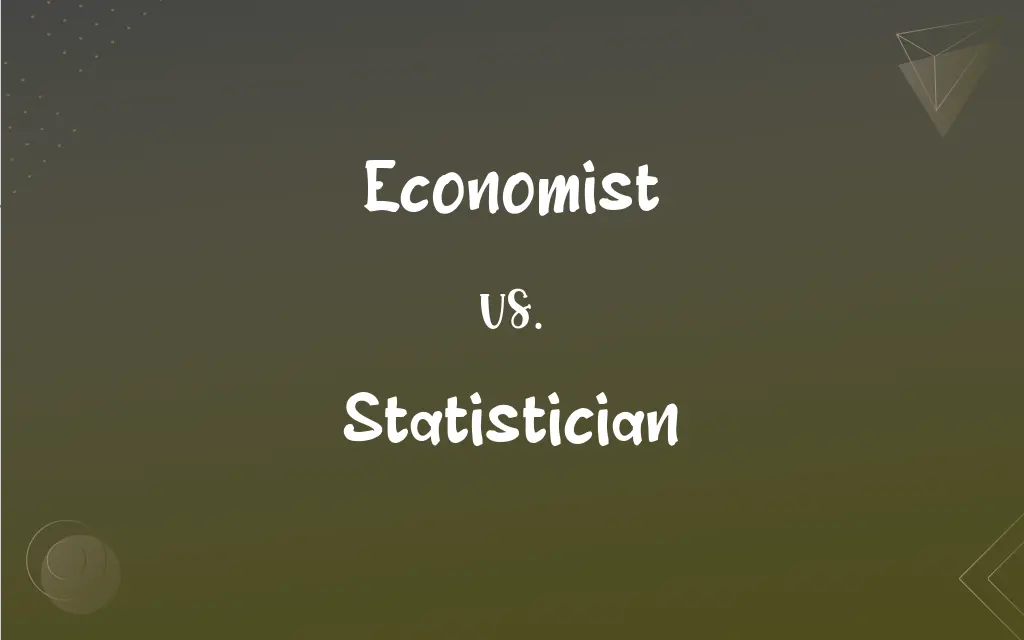Economist vs. Statistician: What's the Difference?
Edited by Aimie Carlson || By Janet White || Published on February 23, 2024
An economist studies economic systems and their impact, while a statistician specializes in the collection, analysis, and interpretation of data.

Key Differences
Economists and statisticians both play crucial roles in analyzing information, but their focus areas differ significantly. An economist studies economic systems, policies, and their impact on societies and governments. They analyze market trends, economic theories, and the effects of policies on the economy. In contrast, a statistician deals primarily with the collection, analysis, interpretation, and presentation of numerical data. They apply statistical methods to gather and analyze data to help in decision-making processes across various fields.
The educational background required for these professions also varies. Economists typically have a degree in economics and are well-versed in economic theories and models. They may work in sectors like government, finance, and academia, applying their understanding of economic relationships to predict market trends and advise on economic policies. Statisticians, however, often have a degree in mathematics or statistics and are experts in statistical theories and methodologies. They work in diverse sectors including healthcare, environmental science, and marketing, providing critical data analysis and predictions.
The methods and tools used by economists and statisticians differ. Economists use economic models and theories to understand complex systems and predict outcomes. They might employ some statistical tools but primarily focus on economic indicators and trends. Statisticians, however, use a variety of statistical software and methodologies to analyze data. Their work is more focused on the technical aspects of data analysis, including designing experiments or surveys and interpreting the statistical results.
The nature of their work also varies. Economists are often involved in policy formulation, economic forecasting, and market analysis. They interpret economic data within the context of economic theories and models. Statisticians, in contrast, are more focused on the design of experiments and surveys, ensuring accurate data collection, and using statistical techniques to draw conclusions from data sets. They might not necessarily focus on economic data but work with data from a variety of fields.
The impact of their work differs. Economists' analyses can influence economic policies and business strategies, affecting economies and markets. Statisticians, on the other hand, provide the backbone for scientific research, policy development, and business decisions through their data analysis, impacting various sectors and disciplines.
ADVERTISEMENT
Comparison Chart
Focus Area
Economic systems, market trends, policies.
Collection, analysis, interpretation of data.
Educational Background
Degree in economics, knowledge of economic theories.
Degree in mathematics or statistics.
Methods and Tools
Economic models and indicators.
Statistical software and methodologies.
Nature of Work
Policy formulation, economic forecasting.
Designing experiments, data analysis.
Impact of Work
Influences economic policies and market strategies.
Supports scientific research, policy development.
ADVERTISEMENT
Economist and Statistician Definitions
Economist
A professional who studies and analyzes economic data and trends.
The economist predicted a rise in inflation rates next quarter.
Statistician
Utilizes statistical methods and software for data interpretation.
Our statistician developed a new model for predicting sales trends.
Economist
Specializes in understanding the complexities of economies and markets.
The economist's report on consumer behavior was enlightening.
Statistician
Works in diverse fields like healthcare, marketing, and environmental science.
The statistician's analysis helped in understanding the disease patterns.
Economist
Can work in various sectors including finance, academia, and government.
The bank hired an economist to forecast future market trends.
Statistician
A professional skilled in the science of collecting and analyzing numerical data.
The statistician presented the survey results with precise accuracy.
Economist
Often involved in policy-making and advising governments or businesses.
An economist was consulted to develop the new economic policy.
Statistician
Designs experiments and surveys to gather reliable data.
A statistician was involved in structuring the clinical trial phases.
Economist
Expert in economic theories and models, applying them to real-world scenarios.
The economist provided a comprehensive analysis of the market crash.
Statistician
Plays a crucial role in decision-making by providing data-driven insights.
Thanks to the statistician's report, the company revised its strategy.
Economist
A specialist in economics.
Statistician
A mathematician specializing in statistics.
Economist
(Archaic) An economical person.
Statistician
A compiler of statistical data.
Economist
An expert in economics, especially one who studies economic data and extracts higher-level information or proposes theories.
Statistician
A person who compiles, interprets, or studies statistics.
Economist
One concerned with political economy.
Statistician
(mathematics) A mathematician with a specialty of statistics.
Economist
(obsolete) One who manages a household.
Statistician
One versed in statistics; one who collects and classifies facts for statistics.
Economist
(obsolete) One who economizes, or manages domestic or other concerns with frugality; one who expends money, time, or labor, judiciously, and without waste.
Statistician
A mathematician who specializes in statistics
Economist
One who economizes, or manages domestic or other concerns with frugality; one who expends money, time, or labor, judiciously, and without waste.
Statistician
Someone versed in the collection and interpretation of numerical data (especially someone who uses statistics to calculate insurance premiums)
Economist
One who is conversant with political economy; an expert in the field of economics.
Economist
An expert in the science of economics
FAQs
What does an economist do?
Analyzes economic data and trends, advises on policies and market strategies.
What education is needed for a statistician?
Usually a degree in statistics or mathematics.
What does a statistician do?
Collects, analyzes, and interprets numerical data for various applications.
Can an economist predict market trends?
Yes, using economic models and theories.
Where can statisticians be employed?
In a wide range of sectors including healthcare, marketing, and environmental science.
Do economists use statistics?
Yes, but as a tool to aid in economic analysis.
What education is required to be an economist?
Typically a degree in economics, often with a focus on economic theories.
Are statisticians involved in policy development?
Yes, through providing essential data analysis and insights.
Do statisticians design experiments?
Yes, they often design experiments and surveys for accurate data collection.
Is an economist's work theoretical or practical?
It can be both, depending on the context and application.
Where do economists typically work?
In government, finance, research institutions, and academia.
Do economists make policy recommendations?
Often, especially in government or institutional roles.
Is a statistician's work only about numbers?
Largely, but it also involves interpreting and presenting the data meaningfully.
Can economists work in business sectors?
Yes, in roles like market analysis and financial forecasting.
Are economists involved in global economic analysis?
Yes, they analyze and interpret global economic trends and issues.
Do statisticians contribute to medical research?
Yes, especially in designing and analyzing clinical trials and studies.
Do statisticians focus on economic data?
They can, but they also work with data from various other fields.
Do statisticians need strong computer skills?
Yes, for using statistical software and data analysis tools.
Can statisticians work in academic research?
Yes, they play a key role in academic studies across various fields.
Do economists collaborate with other professionals?
Often, especially with policymakers, businesses, and other researchers.
About Author
Written by
Janet WhiteJanet White has been an esteemed writer and blogger for Difference Wiki. Holding a Master's degree in Science and Medical Journalism from the prestigious Boston University, she has consistently demonstrated her expertise and passion for her field. When she's not immersed in her work, Janet relishes her time exercising, delving into a good book, and cherishing moments with friends and family.
Edited by
Aimie CarlsonAimie Carlson, holding a master's degree in English literature, is a fervent English language enthusiast. She lends her writing talents to Difference Wiki, a prominent website that specializes in comparisons, offering readers insightful analyses that both captivate and inform.































































